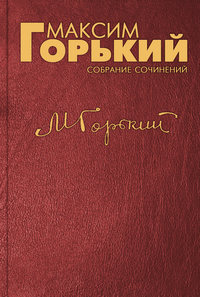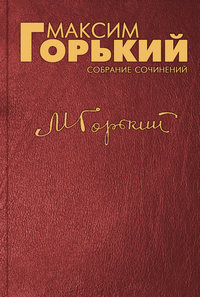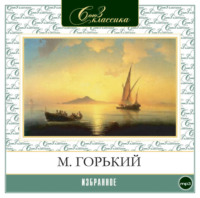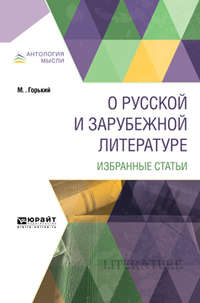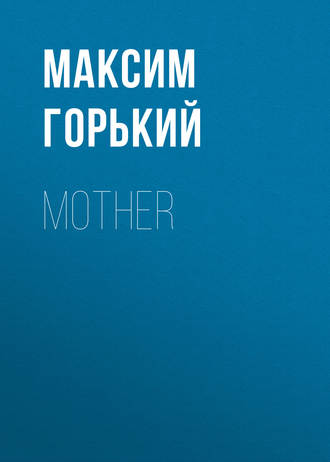 полная версия
полная версияMother
"True, true!" said the curly-headed youth in a low tone.
A heated discussion ensued; and the words flashed like tongues of fire in a wood pile. The mother did not understand what they were shouting about. All faces glowed in an aureole of animation, but none grew angry, no one spoke the harsh, offensive words so familiar to her.
"They restrain themselves on account of a woman's presence," she concluded.
The serious face of Natasha pleased her. The young woman looked at all these young men so considerately, with the air of an elder person toward children.
"Wait, comrades," she broke out suddenly. And they all grew silent and turned their eyes upon her.
"Those who say that we ought to know everything are right. We ought to illumine ourselves with the light of reason, so that the people in the dark may see us; we ought to be able to answer every question honestly and truly. We must know all the truth, all the falsehood."
The Little Russian listened and nodded his head in accompaniment to her words. Vyesovshchikov, the red-haired fellow, and the other factory worker, who had come with Pavel, stood in a close circle of three. For some reason the mother did not like them.
When Natasha ceased talking, Pavel arose and asked calmly:
"Is filling our stomachs the only thing we want?"
"No!" he answered himself, looking hard in the direction of the three. "We want to be people. We must show those who sit on our necks, and cover up our eyes, that we see everything, that we are not foolish, we are not animals, and that we do not want merely to eat, but also to live like decent human beings. We must show our enemies that our life of servitude, of hard toil which they impose upon us, does not hinder us from measuring up to them in intellect, and as to spirit, that we rise far above them!"
The mother listened to his words, and a feeling of pride in her son stirred her bosom – how eloquently he spoke!
"People with well-filled stomachs are, after all, not a few, but honest people there are none," said the Little Russian. "We ought to build a bridge across the bog of this rotten life to a future of soulful goodness. That's our task, that's what we have to do, comrades!"
"When the time is come to fight, it's not the time to cure the finger," said Vyesovshchikov dully.
"There will be enough breaking of our bones before we get to fighting!" the Little Russian put in merrily.
It was already past midnight when the group began to break up. The first to go were Vyesovshchikov and the red-haired man – which again displeased the mother.
"Hm! How they hurry!" she thought, nodding them a not very friendly farewell.
"Will you see me home, Nakhodka?" asked Natasha.
"Why, of course," answered the Little Russian.
When Natasha put on her wraps in the kitchen, the mother said to her: "Your stockings are too thin for this time of the year. Let me knit some woolen ones for you, will you, please?"
"Thank you, Pelagueya Nilovna. Woolen stockings scratch," Natasha answered, smiling.
"I'll make them so they won't scratch."
Natasha looked at her rather perplexedly, and her fixed serious glance hurt the mother.
"Pardon me my stupidity; like my good will, it's from my heart, you know," she added in a low voice.
"How kind you are!" Natasha answered in the same voice, giving her a hasty pressure of the hand and walking out.
"Good night, mother!" said the Little Russian, looking into her eyes. His bending body followed Natasha out to the porch.
The mother looked at her son. He stood in the room at the door and smiled.
"The evening was fine," he declared, nodding his head energetically. "It was fine! But now I think you'd better go to bed; it's time."
"And it's time for you, too. I'm going in a minute."
She busied herself about the table gathering the dishes together, satisfied and even glowing with a pleasurable agitation. She was glad that everything had gone so well and had ended peaceably.
"You arranged it nicely, Pavlusha. They certainly are good people. The Little Russian is such a hearty fellow. And the young lady, what a bright, wise girl she is! Who is she?"
"A teacher," answered Pavel, pacing up and down the room.
"Ah! Such a poor thing! Dressed so poorly! Ah, so poorly! It doesn't take long to catch a cold. And where are her relatives?"
"In Moscow," said Pavel, stopping before his mother. "Look! her father is a rich man; he is in the hardware business, and owns much property. He drove her out of the house because she got into this movement. She grew up in comfort and warmth, she was coddled and indulged in everything she desired – and now she walks four miles at night all by herself."
The mother was shocked. She stood in the middle of the room, and looked mutely at her son. Then she asked quietly:
"Is she going to the city?"
"Yes."
"And is she not afraid?"
"No," said Pavel smiling.
"Why did she go? She could have stayed here overnight, and slept with me."
"That wouldn't do. She might have been seen here to-morrow morning, and we don't want that; nor does she."
The mother recollected her previous anxieties, looked thoughtfully through the window, and asked:
"I cannot understand, Pasha, what there is dangerous in all this, or illegal. Why, you are not doing anything bad, are you?"
She was not quite assured of the safety and propriety of his conduct, and was eager for a confirmation from her son. But he looked calmly into her eyes, and declared in a firm voice:
"There is nothing bad in what we're doing, and there's not going to be. And yet the prison is awaiting us all. You may as well know it."
Her hands trembled. "Maybe God will grant you escape somehow," she said with sunken voice.
"No," said the son kindly, but decidedly. "I cannot lie to you. We will not escape." He smiled. "Now go to bed. You are tired. Good night."
Left alone, she walked up to the window, and stood there looking into the street. Outside it was cold and cheerless. The wind howled, blowing the snow from the roofs of the little sleeping houses. Striking against the walls and whispering something, quickly it fell upon the ground and drifted the white clouds of dry snowflakes across the street.
"O Christ in heaven, have mercy upon us!" prayed the mother.
The tears began to gather in her eyes, as fear returned persistently to her heart, and like a moth in the night she seemed to see fluttering the woe of which her son spoke with such composure and assurance.
Before her eyes as she gazed a smooth plain of snow spread out in the distance. The wind, carrying white, shaggy masses, raced over the plain, piping cold, shrill whistles. Across the snowy expanse moved a girl's figure, dark and solitary, rocking to and fro. The wind fluttered her dress, clogged her footsteps, and drove pricking snowflakes into her face. Walking was difficult; the little feet sank into the snow. Cold and fearful the girl bent forward, like a blade of grass, the sport of the wanton wind. To the right of her on the marsh stood the dark wall of the forest; the bare birches and aspens quivered and rustled with a mournful cry. Yonder in the distance, before her, the lights of the city glimmered dimly.
"Lord in heaven, have mercy!" the mother muttered again, shuddering with the cold and horror of an unformed fear.
CHAPTER IV
The days glided by one after the other, like the beads of a rosary, and grew into weeks and months. Every Saturday Pavel's friends gathered in his house; and each meeting formed a step up a long stairway, which led somewhere into the distance, gradually lifting the people higher and higher. But its top remained invisible.
New people kept coming. The small room of the Vlasovs became crowded and close. Natasha arrived every Saturday night, cold and tired, but always fresh and lively, in inexhaustible good spirits. The mother made stockings, and herself put them on the little feet. Natasha laughed at first; but suddenly grew silent and thoughtful, and said in a low voice to the mother:
"I had a nurse who was also ever so kind. How strange, Pelagueya Nilovna! The workingmen live such a hard, outraged life, and yet there is more heart, more goodness in them than in – those!" And she waved her hand, pointing somewhere far, very far from herself.
"See what sort of a person you are," the older woman answered. "You have left your own family and everything – " She was unable to finish her thought, and heaving a sigh looked silently into Natasha's face with a feeling of gratitude to the girl for she knew not what. She sat on the floor before Natasha, who smiled and fell to musing.
"I have abandoned my family?" she repeated, bending her head down. "That's nothing. My father is a stupid, coarse man – my brother also – and a drunkard, besides. My oldest sister – unhappy, wretched thing – married a man much older than herself, very rich, a bore and greedy. But my mother I am sorry for! She's a simple woman like you, a beaten-down, frightened creature, so tiny, like a little mouse – she runs so quickly and is afraid of everybody. And sometimes I want to see her so – my mother!"
"My poor thing!" said the mother sadly, shaking her head.
The girl quickly threw up her head and cried out:
"Oh, no! At times I feel such joy, such happiness!"
Her face paled and her blue eyes gleamed. Placing her hands on the mother's shoulders she said with a deep voice issuing from her very heart, quietly as if in an ecstasy:
"If you knew – if you but understood what a great, joyous work we are doing! You will come to feel it!" she exclaimed with conviction.
A feeling akin to envy touched the heart of the mother. Rising from the floor she said plaintively:
"I am too old for that – ignorant and old."
Pavel spoke more and more often and at greater length, discussed more and more hotly, and – grew thinner and thinner. It seemed to his mother that when he spoke to Natasha or looked at her his eyes turned softer, his voice sounded fonder, and his entire bearing became simpler.
"Heaven grant!" she thought; and imagining Natasha as her daughter-in-law, she smiled inwardly.
Whenever at the meetings the disputes waxed too hot and stormy, the Little Russian stood up, and rocking himself to and fro like the tongue of a bell, he spoke in his sonorous, resonant voice simple and good words which allayed their excitement and recalled them to their purpose. Vyesovshchikov always kept hurrying everybody on somewhere. He and the red-haired youth called Samoylov were the first to begin all disputes. On their side were always Ivan Bukin, with the round head and the white eyebrows and lashes, who looked as if he had been hung out to dry, or washed out with lye; and the curly-headed, lofty-browed Fedya Mazin. Modest Yakob Somov, always smoothly combed and clean, spoke little and briefly, with a quiet, serious voice, and always took sides with Pavel and the Little Russian.
Sometimes, instead of Natasha, Alexey Ivanovich, a native of some remote government, came from the city. He wore eyeglasses, his beard was shiny, and he spoke with a peculiar singing voice. He produced the impression of a stranger from a far-distant land. He spoke about simple matters – about family life, about children, about commerce, the police, the price of bread and meat – about everything by which people live from day to day; and in everything he discovered fraud, confusion, and stupidity, sometimes setting these matters in a humorous light, but always showing their decided disadvantage to the people.
To the mother, too, it seemed that he had come from far away, from another country, where all the people lived a simple, honest, easy life, and that here everything was strange to him, that he could not get accustomed to this life and accept it as inevitable, that it displeased him, and that it aroused in him a calm determination to rearrange it after his own model. His face was yellowish, with thin, radiate wrinkles around his eyes, his voice low, and his hands always warm. In greeting the mother he would enfold her entire hand in his long, powerful fingers, and after such a vigorous hand clasp she felt more at ease and lighter of heart.
Other people came from the city, oftenest among them a tall, well-built young girl with large eyes set in a thin, pale face. She was called Sashenka. There was something manly in her walk and movements; she knit her thick, dark eyebrows in a frown, and when she spoke the thin nostrils of her straight nose quivered.
She was the first to say, "We are socialists!" Her voice when she said it was loud and strident.
When the mother heard this word, she stared in dumb fright into the girl's face. But Sashenka, half closing her eyes, said sternly and resolutely: "We must give up all our forces to the cause of the regeneration of life; we must realize that we will receive no recompense."
The mother understood that the socialists had killed the Czar. It had happened in the days of her youth; and people had then said that the landlords, wishing to revenge themselves on the Czar for liberating the peasant serfs, had vowed not to cut their hair until the Czar should be killed. These were the persons who had been called socialists. And now she could not understand why it was that her son and his friends were socialists.
When they had all departed, she asked Pavel:
"Pavlusha, are you a socialist?"
"Yes," he said, standing before her, straight and stalwart as always. "Why?"
The mother heaved a heavy sigh, and lowering her eyes, said:
"So, Pavlusha? Why, they are against the Czar; they killed one."
Pavel walked up and down the room, ran his hand across his face, and, smiling, said:
"We don't need to do that!"
He spoke to her for a long while in a low, serious voice. She looked into his face and thought:
"He will do nothing bad; he is incapable of doing bad!"
And thereafter the terrible word was repeated with increasing frequency; its sharpness wore off, and it became as familiar to her ear as scores of other words unintelligible to her. But Sashenka did not please her, and when she came the mother felt troubled and ill at ease.
Once she said to the Little Russian, with an expression of dissatisfaction about the mouth:
"What a stern person this Sashenka is! Flings her commands around! – You must do this and you must do that!"
The Little Russian laughed aloud.
"Well said, mother! You struck the nail right on the head! Hey, Pavel?"
And with a wink to the mother, he said with a jovial gleam in his eyes:
"You can't drain the blue blood out of a person even with a pump!"
Pavel remarked dryly:
"She is a good woman!" His face glowered.
"And that's true, too!" the Little Russian corroborated. "Only she does not understand that she ought to – "
They started up an argument about something the mother did not understand. The mother noticed, also, that Sashenka was most stern with Pavel, and that sometimes she even scolded him. Pavel smiled, was silent, and looked in the girl's face with that soft look he had formerly given Natasha. This likewise displeased the mother.
The gatherings increased in number, and began to be held twice a week; and when the mother observed with what avidity the young people listened to the speeches of her son and the Little Russian, to the interesting stories of Sashenka, Natasha, Alexey Ivanovich, and the other people from the city, she forgot her fears and shook her head sadly as she recalled the days of her youth.
Sometimes they sang songs, the simple, familiar melodies, aloud and merrily. But often they sang new songs, the words and music in perfect accord, sad and quaint in tune. These they sang in an undertone, pensively and seriously as church hymns are chanted. Their faces grew pale, yet hot, and a mighty force made itself felt in their ringing words.
"It is time for us to sing these songs in the street," said Vyesovshchikov somberly.
And sometimes the mother was struck by the spirit of lively, boisterous hilarity that took sudden possession of them. It was incomprehensible to her. It usually happened on the evenings when they read in the papers about the working people in other countries. Then their eyes sparkled with bold, animated joy; they became strangely, childishly happy; the room rang with merry peals of laughter, and they struck one another on the shoulder affectionately.
"Capital fellows, our comrades the French!" cried some one, as if intoxicated with his own mirth.
"Long live our comrades, the workingmen of Italy!" they shouted another time.
And sending these calls into the remote distance to friends who did not know them, who could not have understood their language, they seemed to feel confident that these people unknown to them heard and comprehended their enthusiasm and their ecstasy.
The Little Russian spoke, his eyes beaming, his love larger than the love of the others:
"Comrades, it would be well to write to them over there! Let them know that they have friends living in far-away Russia, workingmen who confess and believe in the same religion as they, comrades who pursue the same aims as they, and who rejoice in their victories!"
And all, with smiles on their faces dreamily spoke at length of the Germans, the Italians, the Englishmen, and the Swedes, of the working people of all countries, as of their friends, as of people near to their hearts, whom without seeing they loved and respected, whose joys they shared, whose pain they felt.
In the small room a vast feeling was born of the universal kinship of the workers of the world, at the same time its masters and its slaves, who had already been freed from the bondage of prejudice and who felt themselves the new masters of life. This feeling blended all into a single soul; it moved the mother, and, although inaccessible to her, it straightened and emboldened her, as it were, with its force, with its joys, with its triumphant, youthful vigor, intoxicating, caressing, full of hope.
"What queer people you are!" said the mother to the Little Russian one day. "All are your comrades – the Armenians and the Jews and the Austrians. You speak about all as of your friends; you grieve for all, and you rejoice for all!"
"For all, mother dear, for all! The world is ours! The world is for the workers! For us there is no nation, no race. For us there are only comrades and foes. All the workingmen are our comrades; all the rich, all the authorities are our foes. When you see how numerous we workingmen are, how tremendous the power of the spirit in us, then your heart is seized with such joy, such happiness, such a great holiday sings in your bosom! And, mother, the Frenchman and the German feel the same way when they look upon life, and the Italian also. We are all children of one mother – the great, invincible idea of the brotherhood of the workers of all countries over all the earth. This idea grows, it warms us like the sun; it is a second sun in the heaven of justice, and this heaven resides in the workingman's heart. Whoever he be, whatever his name, a socialist is our brother in spirit now and always, and through all the ages forever and ever!"
This intoxicated and childish joy, this bright and firm faith came over the company more and more frequently; and it grew ever stronger, ever mightier.
And when the mother saw this, she felt that in very truth a great dazzling light had been born into the world like the sun in the sky and visible to her eyes.
On occasions when his father had stolen something again and was in prison, Nikolay would announce to his comrades: "Now we can hold our meetings at our house. The police will think us thieves, and they love thieves!"
Almost every evening after work one of Pavel's comrades came to his house, read with him, and copied something from the books. So greatly occupied were they that they hardly even took the time to wash. They ate their supper and drank tea with the books in their hands; and their talks became less and less intelligible to the mother.
"We must have a newspaper!" Pavel said frequently.
Life grew ever more hurried and feverish; there was a constant rushing from house to house, a passing from one book to another, like the flirting of bees from flower to flower.
"They are talking about us!" said Vyesovshchikov once. "We must get away soon."
"What's a quail for but to be caught in the snare?" retorted the Little Russian.
Vlasova liked the Little Russian more and more. When he called her "mother," it was like a child's hand patting her on the cheek. On Sunday, if Pavel had no time, he chopped wood for her; once he came with a board on his shoulder, and quickly and skillfully replaced the rotten step on the porch. Another time he repaired the tottering fence with just as little ado. He whistled as he worked. It was a beautifully sad and wistful whistle.
Once the mother said to the son:
"Suppose we take the Little Russian in as a boarder. It will be better for both of you. You won't have to run to each other so much!"
"Why need you trouble and crowd yourself?" asked Pavel, shrugging his shoulders.
"There you have it! All my life I've had trouble for I don't know what. For a good person it's worth the while."
"Do as you please. If he comes I'll be glad."
And the Little Russian moved into their home.
CHAPTER V
The little house at the edge of the village aroused attention. Its walls already felt the regard of scores of suspecting eyes. The motley wings of rumor hovered restlessly above them.
People tried to surprise the secret hidden within the house by the ravine. They peeped into the windows at night. Now and then somebody would rap on the pane, and quickly take to his heels in fright.
Once the tavern keeper stopped Vlasova on the street. He was a dapper old man, who always wore a black silk neckerchief around his red, flabby neck, and a thick, lilac-colored waistcoat of velvet around his body. On his sharp, glistening nose there always sat a pair of glasses with tortoise-shell rims, which secured him the sobriquet of "bony eyes."
In a single breath and without awaiting an answer, he plied Vlasova with dry, crackling words:
"How are you, Pelagueya Nilovna, how are you? How is your son? Thinking of marrying him off, hey? He's a youth full ripe for matrimony. The sooner a son is married off, the safer it is for his folks. A man with a family preserves himself better both in the spirit and the flesh. With a family he is like mushrooms in vinegar. If I were in your place I would marry him off. Our times require a strict watch over the animal called man; people are beginning to live in their brains. Men have run amuck with their thoughts, and they do things that are positively criminal. The church of God is avoided by the young folk; they shun the public places, and assemble in secret in out-of-the-way corners. They speak in whispers. Why speak in whispers, pray? All this they don't dare say before people in the tavern, for example. What is it, I ask? A secret? The secret place is our holy church, as old as the apostles. All the other secrets hatched in the corners are the offspring of delusions. I wish you good health."
Raising his hand in an affected manner, he lifted his cap, and waving it in the air, walked away, leaving the mother to her perplexity.
Vlasova's neighbor, Marya Korsunova, the blacksmith's widow, who sold food at the factory, on meeting the mother in the market place also said to her:
"Look out for your son, Pelagueya!"
"What's the matter?"
"They're talking!" Marya tendered the information in a hushed voice. "And they don't say any good, mother of mine! They speak as if he's getting up a sort of union, something like those Flagellants – sects, that's the name! They'll whip one another like the Flagellants – "
"Stop babbling nonsense, Marya! Enough!"
"I'm not babbling nonsense! I talk because I know."
The mother communicated all these conversations to her son. He shrugged his shoulders in silence, and the Little Russian laughed with his thick, soft laugh.
"The girls also have a crow to pick with you!" she said. "You'd make enviable bridegrooms for any of them; you're all good workers, and you don't drink – but you don't pay any attention to them. Besides, people are saying that girls of questionable character come to you."


